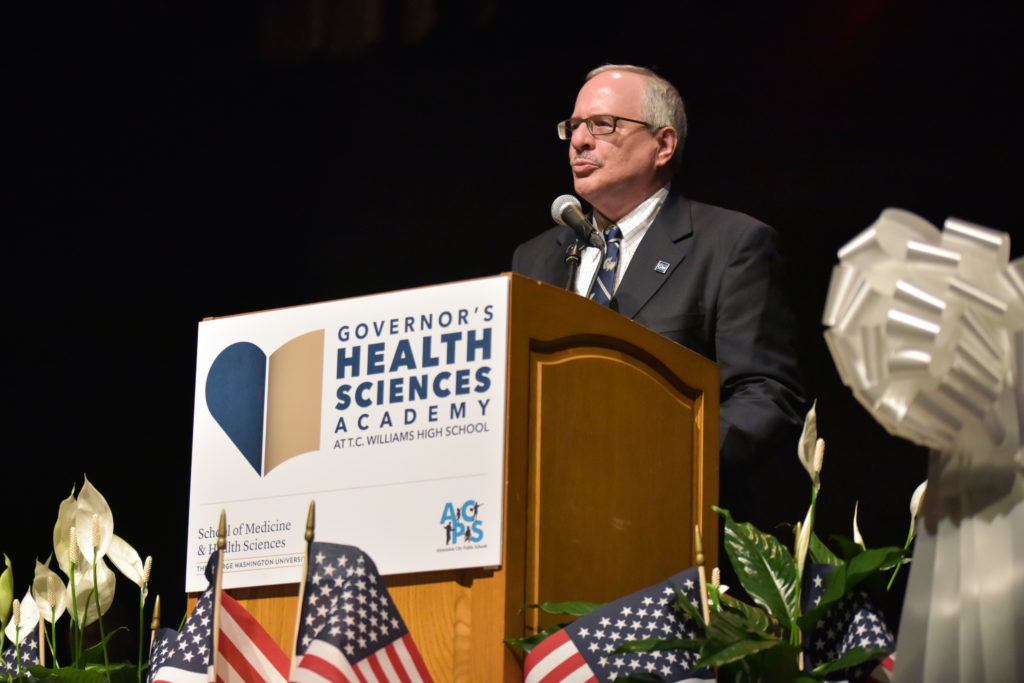Updated: Oct. 12, 2018 at 10:25 a.m.
The School of Medicine and Health Sciences launched a new program this month aiming to spark high school students’ interest in the medical field.
The Governor’s Health Sciences Academy – which was first announced last fall – will allow students from disadvantaged backgrounds at T.C. Williams High School in Alexandria, Va. to participate in a dual-enrollment magnet program educating students about medicine and giving them the opportunity to earn college credit. Officials said the academy, which has secured funding for at least five years, could help address health care shortages in D.C. and foster a more diverse community of students entering the medical field.
The program officially launched after a ribbon-cutting ceremony Friday at the high school, which was attended by medical school faculty, University President Thomas LeBlanc and the governor of Virginia.
Reamer Bushardt, the senior associate dean for health sciences, said GW’s partnership with the high school will allow between 100 to 150 students each year to start their health-science education in high school and continue their undergraduate studies before moving on to medical school.
The program allows students to earn up to 18 college credits and also guarantees admission into GW’s medical school for an undergraduate program. The agreement between the medical school and Alexandria City Public Schools committed the two schools to run the academy for five years.
“The major goals of the academy are to help students identify a career pathway in healthcare that aligns with their personal aspirations, individual strengths and talents, then support their success in the educational pipeline,” Bushardt said in an email.
Bushardt said that in addition to GW’s contribution to the academy, the federal government is also supporting the initiative with a $3.2 million grant from the Health Resources and Services Administration.
He said the grant will help the program support economically and educationally disadvantaged students by providing scholarships and stipends to continue students’ education through the Health Careers Opportunity Program’s National Ambassador Program.
[gwh_image id=”1068023″ credit=”Eric Lee | Hatchet Photographer” align=”none” size=”embedded-img”]Ralph Northam, the governor of Virginia, said the program will address the shortage of health care specialists in the D.C. area.[/gwh_image]
Bushardt said D.C. is also experiencing a shortage in health care professionals, a disparity that he said prompted the creation of the academy.
“A more diverse health care workforce produces better patient outcomes and drives us closer to health equity,” he said. “Racial and ethnic concordance between patients and healthcare professionals is associated with better access to care, improvements in patient adherence and more favorable patient and family experience.”
Bushardt added that one of the main goals of the academy is to educate students about “cultural competency” and to help students build skills that will help them address health equity in their future positions as medical professionals. He said that through the governor’s academy, students will be able to take classes that address issues of health equity, including instruction on communication skills, community engagement and health promotion.
“Health equity, or the attainment of the highest level of health for all people, is an elusive challenge and must become an imperative within U.S. healthcare if we want a healthy, prosperous society,” he said.
University President Thomas LeBlanc, who spoke at the ceremony, said GW is committed to striving “for preeminence in all our endeavors.” He added that he hopes students will continue their studies and research at GW, to which they are guaranteed admission after graduation.
“It’s clear that this region is a hub for innovation, problem-solving and addressing society’s most complicated issues,” LeBlanc said at the event. “Today, with the start of this governor’s academy, we are beginning the process of tackling the health care workforce challenge.”
Ralph Northam, the governor of Virginia, said the program will address the shortage of health care specialists in the D.C. area, and he hopes to expand the program to more schools in the future.
“This is why this is such a good program at T.C. Williams in Alexandria, and I think it can be a model for a state,” he said at the event.
Elizabeth Vickrey Lodal, a member of the Virginia Board of Education, said the program will not only allow students to serve their community but also help students discover a potential career path in the medical field.
“It’s going to give hundreds if not thousands of young people a new vision of what they can become and how they can serve a larger community and truly learn skills from top professionals and be exposed to a university at the same time,” she said in an interview.
Vickrey Lodal said the program allows students to see beyond the need to “get rich” from their occupation and focus on the greater impact of improving communities and helping people in need.
“The students in this program hope to earn a good income, but they are not here just to get rich,” she said. “They are here to enrich the larger community, by virtue of the experience of they are having at this school.”
This post was updated to reflect the following clarification:
Language was added to this article to clarify that students who have completed the high school program are guaranteed admission to an undergraduate program at the medical school.





